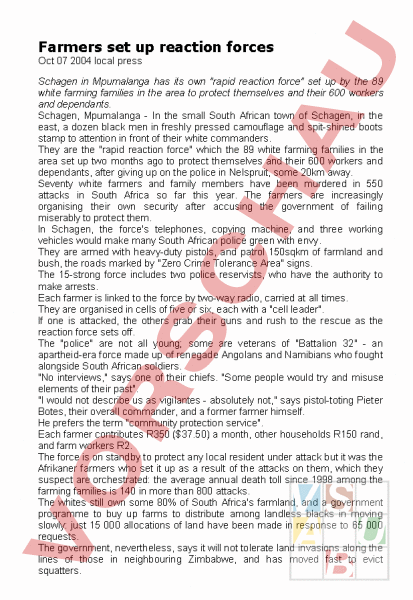Arbeitsblatt: Farmers in South Africa
Material-Details
Zeitungsmeldung (local press of Schagen SA): Wie sich Farmer gegen zunehmende Gewalt schützen müssen.
Englisch
Lesen / Literatur
9. Schuljahr
2 Seiten
Statistik
4969
1657
20
03.03.2007
Autor/in
Kurt Leiser
Bonstettenweg 9
3626 Hünibach
3626 Hünibach
033 243 44 27
Land: andere Länder
Registriert vor 2006
Textauszüge aus dem Inhalt:
Farmers set up reaction forces Oct 07 2004 local press Schagen in Mpumalanga has its own rapid reaction force set up by the 89 white farming families in the area to protect themselves and their 600 workers and dependants. Schagen, Mpumalanga In the small South African town of Schagen, in the east, dozen black men in freshly pressed camouflage and spit-shined boots stamp to attention in front of their white commanders. They are the rapid reaction force which the 89 white farming families in the area set up two months ago to protect themselves and their 600 workers and dependants, after giving up on the police in Nelspruit, some 20km away. Seventy white farmers and family members have been murdered in 550 attacks in South Africa so far this year. The farmers are increasingly organising their own security after accusing the government of failing miserably to protect them. In Schagen, the force telephones, copying machine, and three working vehicles would make many South African police green with envy. They are armed with heavy-duty pistols, and patrol 150sqkm of farmland and bush, the roads marked by Zero Crime Tolerance Area signs. The 15-strong force includes two police reservists, who have the authority to make arrests. Each farmer is linked to the force by two-way radio, carried at all times. They are organised in cells of five or six, each with cell leader. If one is attacked, the others grab their guns and rush to the rescue as the reaction force sets off. The police are not all young; some are veterans of Battalion 32 an apartheid-era force made up of renegade Angolans and Namibians who fought alongside South African soldiers. No interviews, says one of their chiefs. Some people would try and misuse elements of their past. I would not describe us as vigilantes absolutely not, says pistol-toting Pieter Botes, their overall commander, and former farmer himself. He prefers the term community protection service. Each farmer contributes R350 ($37.50) month, other households R150 rand, and farm workers R2. The force is on standby to protect any local resident under attack but it was the Afrikaner farmers who set it up as result of the attacks on them, which they suspect are orchestrated: the average annual death toll since 1998 among the farming families is 140 in more than 800 attacks. The whites still own some 80% of South Africa farmland, and government programme to buy up farms to distribute among landless blacks in moving slowly: just 15 000 allocations of land have been made in response to 65 000 requests. The government, nevertheless, says it will not tolerate land invasions along the lines of those in neighbouring Zimbabwe, and has moved fast to evict squatters. Human Rights Watch meanwhile noted in recent report, entitled Unequal protection, that attacks against farm owners have gotten most of the attention, but attacks against other farm residents are much bigger problem. Members of the commandos, police reservists, soldiers, police and others participating in the rural protection plan have committed serious abuses against farm workers and other farm residents, it said. The Schagen force has not yet come face-to-face with full-scale attack on farm, but farmer Anton Hough points out that you cant count the attacks that weve dissuaded. The force tally: four firearms confiscated; $14 000 worth of marijuana nabbed; and three illegal bars closed down. They have also settled drunken quarrels and neighbours disputes among the farm-workers. The increased security is having ripple effect. renovated rural school, supported by charities and local businesses, caters for 102 pupils. The parents say they feel safer now, says Mary Lebostchy, the director of the project. The attendance record has increased dramatically since June, and security fence will soon be completed allowing the children to plant vegetable gardens. The farmers, descendants of the fiercely individualistic Boer pioneers, are also discovering sense of community through sharing protection, to point where they are now talking about opening up their Umsileszi valley to tourists, with the idea of putting up cable car, establishing horse rides and selling local crafts. Agri SA, the white farmers organisation, with 70 000 members, wants to improve the image of the farmer and sensitise the farmer as to the role he can play in upliftment effort at local level within an existing structure. That is happening here even if no black yet sits on the Schagen safety committee, as one member deplored. Sapa-AFP
